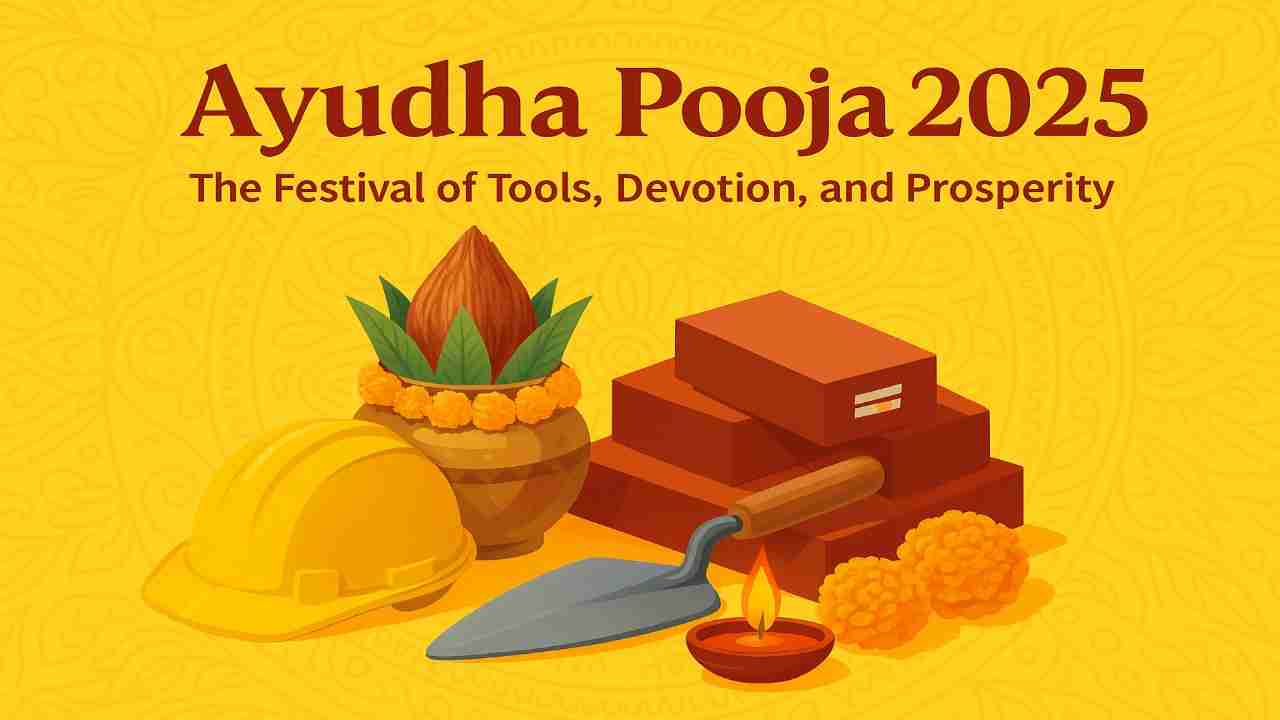
Have you ever seen people decorating their vehicles, tools, and even laptops with flowers and worshipping them during Navratri? That beautiful celebration is called Ayudha Pooja, a festival that goes beyond rituals, symbolizing respect for the very instruments that help us live and work.
In this blog, we’ll explore the significance of Ayudha Pooja, its history, rituals, date, and meaningful wishes you can share with loved ones. By the end, you’ll understand why Ayudha Pooja is more than just tradition, it’s gratitude in action.
What is Ayudha Pooja?
The word Ayudha means “weapon” or “tool,” and Pooja means “worship.” Together, Ayudha Pooja literally means “the worship of tools.” While in ancient times warriors worshipped their weapons on this day, today people across India honor their modern instruments—be it books, pens, machines, vehicles, or even digital devices.
This festival is celebrated during the Navratri season (on the ninth day, called Maha Navami), symbolizing the victory of good over evil. It reminds us to treat our tools of livelihood not as mere objects but as sacred companions in our journey.
The Mythological Roots
The origin of Ayudha Pooja goes back to the Mahishasura Mardini story. According to Hindu mythology, Goddess Durga fought the demon king Mahishasura for nine days and finally destroyed him on the tenth day, celebrated as Vijayadashami (Dussehra).
On the ninth day—Ayudha Pooja—the Goddess is believed to have rested and blessed the weapons that helped her win the battle. Inspired by this, kings and warriors of ancient India began worshipping their weapons before war. Over time, this extended to farmers, artisans, teachers, and workers of all kinds, who started worshipping their tools and instruments.
Thus, Ayudha Pooja became a festival of gratitude—towards work, knowledge, and divine power.
When is Ayudha Pooja in 2025?
The Ayudha Pooja date changes every year based on the lunar calendar. In 2025, Ayudha Pooja will be celebrated on October 1 (Wednesday).
It falls on the Maha Navami day of Navratri, one day before Vijayadashami. This alignment with Durga Puja and Dussehra adds to its spiritual significance.
How this Pooja is Celebrated?
The celebration of Ayudha Pooja varies across India, but the essence remains the same: honoring tools, vehicles, and books as embodiments of divine power.
1. Preparation and Cleaning
- People clean and polish their tools, vehicles, and household items.
- Books, notebooks, and instruments are neatly arranged for worship.
2. Decoration
- Tools and vehicles are decorated with sandal paste, turmeric, kumkum, and fresh flowers.
- Vehicles are often adorned with garlands and colorful rangoli in front of them.
3. The Ritual
- A puja thali with turmeric, kumkum, betel leaves, coconuts, and sweets is prepared.
- Incense sticks and lamps are lit.
- Tools, books, and vehicles are worshipped with mantras and offered prasadam.
4. Rest from Work
- Traditionally, people avoid using the tools kept for worship until the pooja is over.
- Students also refrain from reading their books, offering them instead to Goddess Saraswati for blessings.
5. Community and Family Gatherings
- Families come together to pray for prosperity, safety, and success.
- In many parts of South India, processions and cultural programs are organized.
Regional Celebrations of Ayudha Pooja
Tamil Nadu
Ayudha Pooja is celebrated with grandeur. Schools, factories, and households conduct puja for their books, tools, and vehicles. Farmers worship their ploughs and cattle.
Karnataka
Known as Ayudha Habba, it is a state-wide festival. Vehicles and weapons are decorated, and people seek Goddess Chamundeshwari’s blessings.
Kerala
Here, Ayudha Pooja is closely linked with Vidyarambham (initiation into learning). Children write their first letters in rice or sand as a symbolic gesture of seeking Saraswati’s grace.
Andhra Pradesh & Telangana
Books and tools are placed in front of Goddess Saraswati’s idol. Cultural performances and recitations are organized.
North India
Though less prominent compared to the South, Ayudha Pooja merges with the Navratri and Dussehra celebrations, with worship of vehicles and tools.
The Spiritual Significance
At its core, Ayudha Pooja is about gratitude. It teaches us:
- To respect the means of livelihood.
- To acknowledge that success comes from effort combined with divine blessings.
- To pause, reflect, and honor the connection between humans and their work.
In today’s modern world, this festival beautifully bridges tradition with practicality—reminding us to be thankful for our laptops, pens, cars, and machines that sustain our daily lives.
Ayudha Pooja Wishes: Spreading Joy and Gratitude
Festivals are also about sharing joy. Sending Ayudha Pooja wishes to friends, family, and colleagues is a way to spread positivity and blessings.
Spreading Joy and Gratitude
Festivals are also about sharing joy. Sending Ayudha Pooja wishes to friends, family, and colleagues is a way to spread positivity and blessings.
Here are some heartfelt Happy Ayudha Pooja wishes you can share:
- “May this sacred day bless your hard work with prosperity and fill your path with endless achievements.”
- “Heartfelt Ayudha Pooja greetings to you and your loved ones—may your home be filled with devotion, gratitude, and happiness.”
- “Honor the tools of your trade, respect your efforts, and welcome the divine energy of success this festive season.”
- “Wishing you safe travels, steady growth in your profession, and a joyful family life this Ayudha Pooja.”
- “May your sincere efforts on this Ayudha Pooja lead you toward new opportunities, success, and a life filled with prosperity.”
- “This special day inspires us to respect our work, honor our instruments, and express gratitude for divine grace.”
Why Share Ayudha Pooja Wishes?
- To strengthen personal and professional bonds.
- To honor the cultural and spiritual values of the festival.
- To inspire gratitude and positivity in others.
Just like tools help us work, words help us connect—so heartfelt wishes on Ayudha Pooja carry immense meaning.
Lessons from this Pooja
Like mythology teaches us through stories, Ayudha Pooja too holds timeless lessons:
- Gratitude: Be thankful for what you have before seeking more.
- Respect for Work: Every profession has dignity; tools symbolize hard work.
- Balance of Tradition and Modernity: Even in a digital era, ancient wisdom guides us.
- Unity in Diversity: Different regions celebrate differently, but the spirit remains one.
The pooja is more than just a ritual, it’s a celebration of gratitude, devotion, and prosperity. From worshipping weapons in ancient times to honoring laptops and vehicles today, the festival has evolved yet retained its deep spiritual essence.
As you celebrate this year, take a moment to thank the tools and people who make your life meaningful.
Share warm wishes with your loved ones and spread the spirit of gratitude.
Want to explore more about Indian festivals and mythology? Check out our blogs on Durga Maa and Dussehra.
Also Read: When is Dhanteras in 2025? Date, Puja Timings, Significance & Rituals

